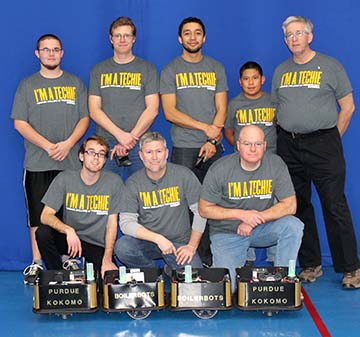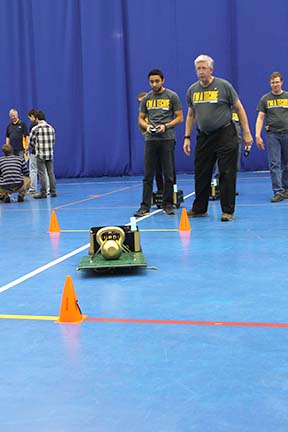by Mark Carnes, clinical assistant professor
 A team of football-playing robots, designed and built by students at Purdue University College of Technology, Kokomo, competed in an NFL style combine at the University of Notre Dame’s Joyce Center April 5, 2014. The combine consisted of individual skill events, testing the robot players’ speed, agility, strength and robustness, followed by a short scrimmage, testing their ability to play American football as a team.
A team of football-playing robots, designed and built by students at Purdue University College of Technology, Kokomo, competed in an NFL style combine at the University of Notre Dame’s Joyce Center April 5, 2014. The combine consisted of individual skill events, testing the robot players’ speed, agility, strength and robustness, followed by a short scrimmage, testing their ability to play American football as a team.
Five teams participated in the event: Purdue College of Technology, Kokomo; the U.S. Naval Academy; University of Notre Dame; Purdue University Calumet; and Purdue College of Technology, South Bend.
The Kokomo team won both the speed and the agility tests by comfortable margins over the Navy players. The speed test required each player to cover a 60-foot, straight but narrow course with two direction changes. The agility test required each player to negotiate a winding course with multiple turns and direction changes.
Navy won the strength test by a narrow margin. This test consisted of pushing a 30-pound weight 10 feet as quickly as possible. Navy also won the passing contest, as they were the only team that had a functioning passer.
By the time of the scrimmage, the Calumet and South Bend robots were no longer functional, so Kokomo and Navy teamed up against a team from Notre Dame to play a few series of downs. On their first possession, Notre Dame was unable to move the ball, then lost it on a fumble. On Purdue/Navy’s first possession, Purdue’s “Sparky” broke free around left end and went all the way for the game’s first touchdown. Notre Dame then attempted a passing attack, but was unable to complete any passes before their quarterback went down on a hard hit by Purdue’s “Petey.” On their next possession, Petey found an opening through the line for another score. The scrimmage ended with the Purdue /Navy team defeating Notre Dame 14-0.
The final test of the day was a robustness test, in which each player was struck by a large weight swinging on a pendulum. The player would pass the test if it was able to drive away after the hit. All of the Purdue College of Technology, Kokomo players passed the test easily due to the strength of their design, while one of the Navy players failed when his battery wires broke loose.
In the final composite scoring, the Naval Academy narrowly edged out the Kokomo team for the overall championship prize of $2,000.
 The Kokomo team also received a lot of positive comments from participants, judges, and spectators about the appearance and construction of their players. Mike Stanisic, faculty advisor to the Notre Dame team commented, “the machines Kokomo brought were the best I have ever seen. I was very impressed.” The use of the Purdue Black and Gold color scheme along with the modular design resulted in a very sharp-looking team.
The Kokomo team also received a lot of positive comments from participants, judges, and spectators about the appearance and construction of their players. Mike Stanisic, faculty advisor to the Notre Dame team commented, “the machines Kokomo brought were the best I have ever seen. I was very impressed.” The use of the Purdue Black and Gold color scheme along with the modular design resulted in a very sharp-looking team.
Another great feature of the day was the camaraderie that quickly developed among the players from the various schools. They could often be seen sitting together comparing notes on their design ideas, issues they had faced, and decisions they had made. All were freely sharing their ideas in a spirit of cooperation.
For the Kokomo team, in addition to being a lot of fun, the competition was a valuable test of the current state of their designs, and provided a lot of direction for future design improvements as they move forward in their efforts to build a complete team of robots to be able to compete for the national championship of robotic football.
The Purdue College of Technology, Kokomo, as part of Purdue’s presence around the state, focuses on offering technology education in North Central Indiana. It offers degrees in computer and information technology, electrical engineering technology, mechanical engineering technology and organizational leadership on the campus of Indiana University Kokomo.
